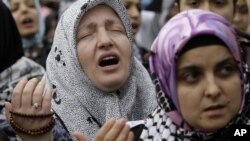InTurkey's largest city, a revolution is occurring in its mosques. A project has been launched to make the mosques female friendly. But the initiative is not without controversy.
Kadriye Avci Erdemli is talking with one of Istanbul's Imams over the state of the women's section of his mosque. The small area is filthy and cramped. Erdemli is Istanbul's deputy muftu, the city's second most senior official responsible for administering the Islamic faith. She is in charge of a radical program to make mosques female friendly.
“This is the first project of its kind in the Muslim world." she said. "When a woman steps into a mosque she is entering the house of God and she should experience the same sacred treatment. In front of God, men and women are equal."
Since March, Erdemli has sent out scores of teams to visit some 3,000 mosques in Istanbul to assess the facilities for women. Erdemli says the discoveries are shocking. “Many mosques had no toilets for women or indeed any place for them to wash," she says. "The areas for women were either filthy or used as storage depots," she said.
But it’s not just about cleaning up the mosques. Partitions separating men and women, whether it’s a wall or a curtain, are also meant to come down, although women will not be praying side-by-side with men, but behind them. The mosques have until February to implement the changes.
But change isn’t always easy, especially in the realm of religion. And for the past couple of months Erdemli has held almost 40 meetings with imams and religious officials across the city to explain the reforms are in compliance with the Koran.
On the streets of Istanbul there appears to be broad support for the changes among religious women. Thirty-year-old Ayse Gul is typical. “The women's sections are much smaller than the men's - they’re almost like spaces left over, at the back or in the corner. It’s time women got more and cleaner areas to pray in,” she said.
Ayse Gul is part of Turkey's rapidly growing Islamic middle class which emerged under the decade long rule of the pro Islamic AK party.
The AK party has also lifted or eased restrictions in education and employment for women wearing islamic headscarves.
Professor Istar Gozaydin an expert on religious affairs at Istanbul's Dogus University says the opening up of mosques to women is being fueled by the growing number of professional women. “We see more and more (Islamic) women are getting educated in the universities women are attending work place and they've been able to become more visible in the society. Previously they were more in their homes previously took their traditional roles taking care of the kids. Now more and more women are participating in the professional lives. And they want to be part of the mosque system," he said.
But not all are happy with such developments. Islamic newspaper columnists have strongly criticized the initiative accusing it of encouraging women to leave the home and adopting western lifestyles. And their criticism is being echoed by the male faithful.
The call to prayer at Istanbul's Suleymania mosque summons worshippers. Many here have misgivings about the initiative. Fifty-year-old Mehmet Gul is a local shopkeeper who says, “I think the place for women is their home. They should practice their prayers at home. The mosques are not big enough even for men," he says. "Especially on Friday prayers and during religious festivities there is not enough room for men. It’s not good for women to come.”
But even some women have reservations, especially over removing curtains and walls separating the male and female worshippers.
“Women must be separated from the men. There has to be a curtain. This is the religious code of conduct," said one woman. "The women are "mahrem", [or] forbidden, and the men should not be able to see them.”
Deputy Muftu Erdemli acknowledges there is still much work to do in winning over the hearts and minds of the faithful, even among some women. But she’s also convinced there can be no turning back.
Istanbul Working to Make Mosques More Female-Friendly
- By Dorian Jones




